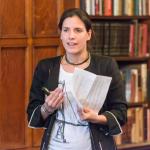
“Understanding how economics became a mathematical science is to understand the lives of those who have been credited for having made economics a mathematical science… From life-writing in science we can learn to think of the meaning of the scientist’s life for science and, perhaps more important, the meaning of science for the scientist’s life. A generation of scholars socialized between the Wars, having gone through the years of WWII, tried to establish careers in a marginalized academic field. How could their work silence the existential labor that brought it about? We view scientific practice thus as existential projects. Becoming a scientist is to recognize oneself as a self-in-pursuit of knowledge, and it is our task as historians to examine how this identification occurred or failed to occur. What coherence or dissonance was there between their lives and the science they brought about?”
“With this question in mind, we will begin by following the early career of our agents in their attempts at forming a scientific self. That is, we try to understand the existential choices and needs which committed their intellectual lives to the emerging field of mathematical economics. What sense of meaning, what hopes led them into mathematical economics? Since this field was both at the margin of economics and at the margin of mathematics, what led them to accept the risks they took? What sense of personal meaning did they ascribe to their emerging professional identities?”
“The significance of Arrow’s, Debreu’s, and McKenzie’s personal life stories thus lies in the central character of modern knowledge in general and mathematical modeling in particular: the impersonality of mathematical modes of expression …. how do members of a community come to embody disembodied knowledge? We approach this question by investigating how the impersonality of knowledge created complex relationships between the life and the work of our three men. Our story will consequently explore the tension between the density and weight of their personal experiences and the aloofness and purity of the impersonal knowledge that they were creating. In the face of this depersonalization of knowledge, we see our job as historians as one of reconceptualizing these changes by re-personalizing them.”

The work of mathematics might be abstract, but we assert that it nonetheless expresses the life of the scientist performing that work… The rhetoric of science may modulate the scientist’s voice, but as scientists show us how to represent and intervene in the world, they also show us how they experience the world. We can understand this peculiar human practice called science by viewing it less as a way of representing the world, but as a way of dealing with the world…Our task as historians of science is to give voice to the mute experiences of those who dedicated their lives to the silence and discretion of reason so prized during the early Cold War years.






